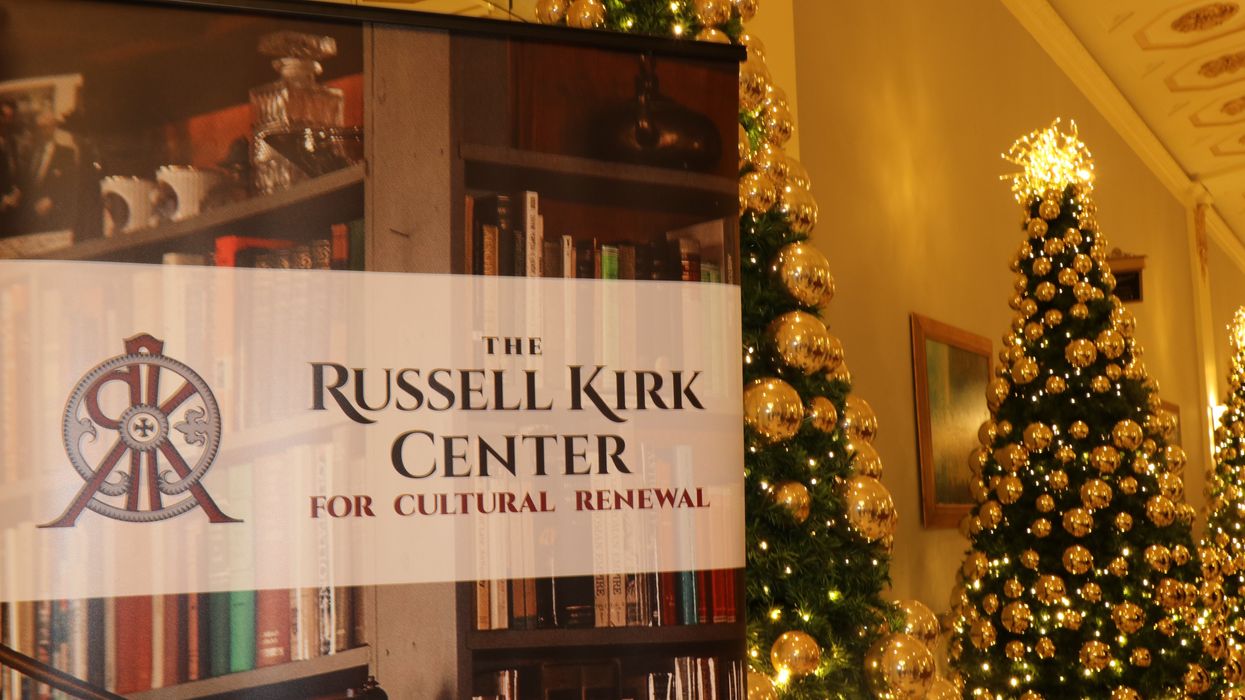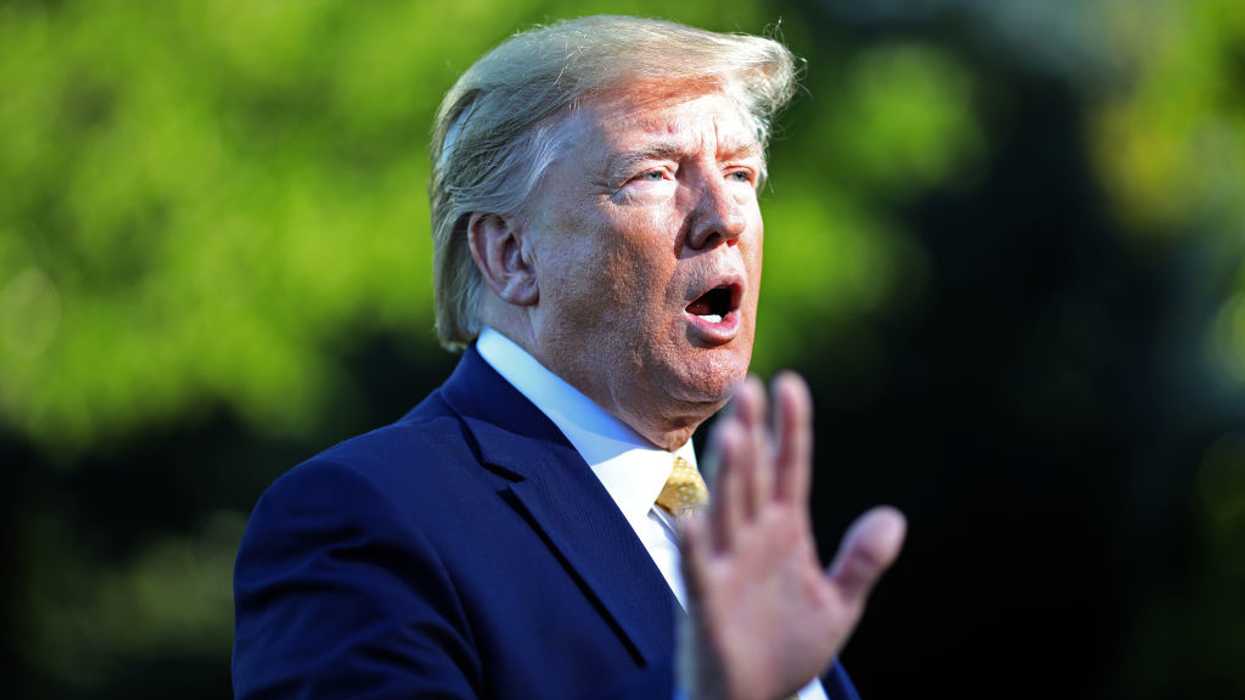Baker and Mason are graduate students for Medill on the Hill, a program of Northwestern University in which students serve as mobile journalists reporting on events in and around Washington, D.C.
Seventy years after Russell Kirk published “The Conservative Mind,” the center named after him revealed plans to develop a school to train conservative thinkers for the future.
The Russell Kirk Center for Cultural Renewal announced The School of Conservative Studies at a Dec. 5 event in Washington, D.C., that was headlined by former Vice President Mike Pence. Pence lauded Kirk as “the intellectual father of the American conservative movement [and] the author of a book we celebrate 70 years now that literally changed the course, not of a movement, but of a country.”
Written in 1953, Kirk’s opus helped fuel the modern conservative movement for decades. The philosophical text promoted ideas like societal order and traditionalism by highlighting prominent conservative thinkers like poet T.S. Eliot and 18th century Irish statesman Edmund Burke.
The book’s 70th anniversary comes as the GOP wrestles with evolving party dynamics. While former President Donald Trump dominates the party, some influential Republicans say he is not a conservative. A recent study by the Associated Press found that just 9 percent of Republicans feel that they can speak openly about their views on college campuses.
One speaker praised Pence’s actions on Jan. 6, 2021, when he rejected Trump’s calls for Pence to declare that the defeated president had actually won the 2020 election.
“Mike Pence will be validated and honored across the political spectrum for the courage that he's shown on that day,” said John Wood Jr., a national ambassador for Braver Angels, a crosspartisan group focused on depolarization. “You just may not be able to see it in the passions of the moment, but we feel that vindication rising.”
Kelsey Baker and Anastasia Mason
Wood’s comments came the day before 10 Wisconsin Republicans who supported Trump’s false election-win claims in 2020 agreed to acknowledge President Joe Biden’s legitimate election. They agreed to not serve as presidential electors in 2024.
Despite Trump’s dominance in the battle for the 2024 Republican presidential nomination, no one mentioned his name throughout the event.
Representatives of the Kirk Center did not respond to requests for interviews to explain whether their new school (slated to open in 2025) was designed to offer an alternative to the MAGA-dominated Republican Party. However, the center’s director made it clear that he believes the conservative movement needs an intellectual revival.
“Contemporary students have little exposure to serious conservative thought,” said Jeffrey Nelson, executive director and CEO of the Kirk Center. “What's particularly distressing to me, and I know to many of you, is that young conservatives today, many at least, now exhibit high levels of civic and cultural illiteracy. There is then the urgent need for learning experiences that engage intellectual conservatism at its best.”
During the event, a panel of young activists presented their ideas on the current struggles and the future of the conservative movement. According to research from Tufts University, only 65 percent of young Republicans identify as conservatives, compared to 81 percent of older Republicans. In the last presidential election, just 37 percent of voters aged 18-29 voted Republican.
“When they look at conservatism, they assume that it's a stale political philosophy that protects old, withered and sometimes even bad ideas,” said University of Notre Dame doctoral student Elayne Allen, who served on the panel. “And at worst, they see a bunch of reactionaries who dislike any kind of change, and this might be true of some conservatives, but I would argue that thinking is actually quite indispensable to conservatism.”
The panelists said conservative politicians have struggled to draw young people to the polls at a time when the country needs more spiritual and moral guidance.
“The conservatives and ‘The Conservative Mind’ frequently lose the political battle of the moment,” Wood said. “What Kirk is valorizing, oftentimes, is the necessity for standing up for lost causes.”
The push to highlight younger conservatives and create the School of Conservative Studies is at least partly rooted in the ideological divide between generations. While studies have shown that Americans tend to get more conservative as they age, the movement would benefit from younger supporters now, especially after Republicans took major losses in Virginia, Kentucky and Ohio in November’s elections.



















Eric Trump, the newly appointed ALT5 board director of World Liberty Financial, walks outside of the NASDAQ in Times Square as they mark the $1.5- billion partnership between World Liberty Financial and ALT5 Sigma with the ringing of the NASDAQ opening bell, on Aug. 13, 2025, in New York City.
Why does the Trump family always get a pass?
Deputy Attorney General Todd Blanche joined ABC’s “This Week” on Sunday to defend or explain a lot of controversies for the Trump administration: the Epstein files release, the events in Minneapolis, etc. He was also asked about possible conflicts of interest between President Trump’s family business and his job. Specifically, Blanche was asked about a very sketchy deal Trump’s son Eric signed with the UAE’s national security adviser, Sheikh Tahnoon.
Shortly before Trump was inaugurated in early 2025, Tahnoon invested $500 million in the Trump-owned World Liberty, a then newly launched cryptocurrency outfit. A few months later, UAE was granted permission to purchase sensitive American AI chips. According to the Wall Street Journal, which broke the story, “the deal marks something unprecedented in American politics: a foreign government official taking a major ownership stake in an incoming U.S. president’s company.”
“How do you respond to those who say this is a serious conflict of interest?” ABC host George Stephanopoulos asked.
“I love it when these papers talk about something being unprecedented or never happening before,” Blanche replied, “as if the Biden family and the Biden administration didn’t do exactly the same thing, and they were just in office.”
Blanche went on to boast about how the president is utterly transparent regarding his questionable business practices: “I don’t have a comment on it beyond Trump has been completely transparent when his family travels for business reasons. They don’t do so in secret. We don’t learn about it when we find a laptop a few years later. We learn about it when it’s happening.”
Sadly, Stephanopoulos didn’t offer the obvious response, which may have gone something like this: “OK, but the president and countless leading Republicans insisted that President Biden was the head of what they dubbed ‘the Biden Crime family’ and insisted his business dealings were corrupt, and indeed that his corruption merited impeachment. So how is being ‘transparent’ about similar corruption a defense?”
Now, I should be clear that I do think the Biden family’s business dealings were corrupt, whether or not laws were broken. Others disagree. I also think Trump’s business dealings appear to be worse in many ways than even what Biden was alleged to have done. But none of that is relevant. The standard set by Trump and Republicans is the relevant political standard, and by the deputy attorney general’s own account, the Trump administration is doing “exactly the same thing,” just more openly.
Since when is being more transparent about wrongdoing a defense? Try telling a cop or judge, “Yes, I robbed that bank. I’ve been completely transparent about that. So, what’s the big deal?”
This is just a small example of the broader dysfunction in the way we talk about politics.
Americans have a special hatred for hypocrisy. I think it goes back to the founding era. As Alexis de Tocqueville observed in “Democracy In America,” the old world had a different way of dealing with the moral shortcomings of leaders. Rank had its privileges. Nobles, never mind kings, were entitled to behave in ways that were forbidden to the little people.
In America, titles of nobility were banned in the Constitution and in our democratic culture. In a society built on notions of equality (the obvious exceptions of Black people, women, Native Americans notwithstanding) no one has access to special carve-outs or exemptions as to what is right and wrong. Claiming them, particularly in secret, feels like a betrayal against the whole idea of equality.
The problem in the modern era is that elites — of all ideological stripes — have violated that bargain. The result isn’t that we’ve abandoned any notion of right and wrong. Instead, by elevating hypocrisy to the greatest of sins, we end up weaponizing the principles, using them as a cudgel against the other side but not against our own.
Pick an issue: violent rhetoric by politicians, sexual misconduct, corruption and so on. With every revelation, almost immediately the debate becomes a riot of whataboutism. Team A says that Team B has no right to criticize because they did the same thing. Team B points out that Team A has switched positions. Everyone has a point. And everyone is missing the point.
Sure, hypocrisy is a moral failing, and partisan inconsistency is an intellectual one. But neither changes the objective facts. This is something you’re supposed to learn as a child: It doesn’t matter what everyone else is doing or saying, wrong is wrong. It’s also something lawyers like Mr. Blanche are supposed to know. Telling a judge that the hypocrisy of the prosecutor — or your client’s transparency — means your client did nothing wrong would earn you nothing but a laugh.
Jonah Goldberg is editor-in-chief of The Dispatch and the host of The Remnant podcast. His Twitter handle is @JonahDispatch.